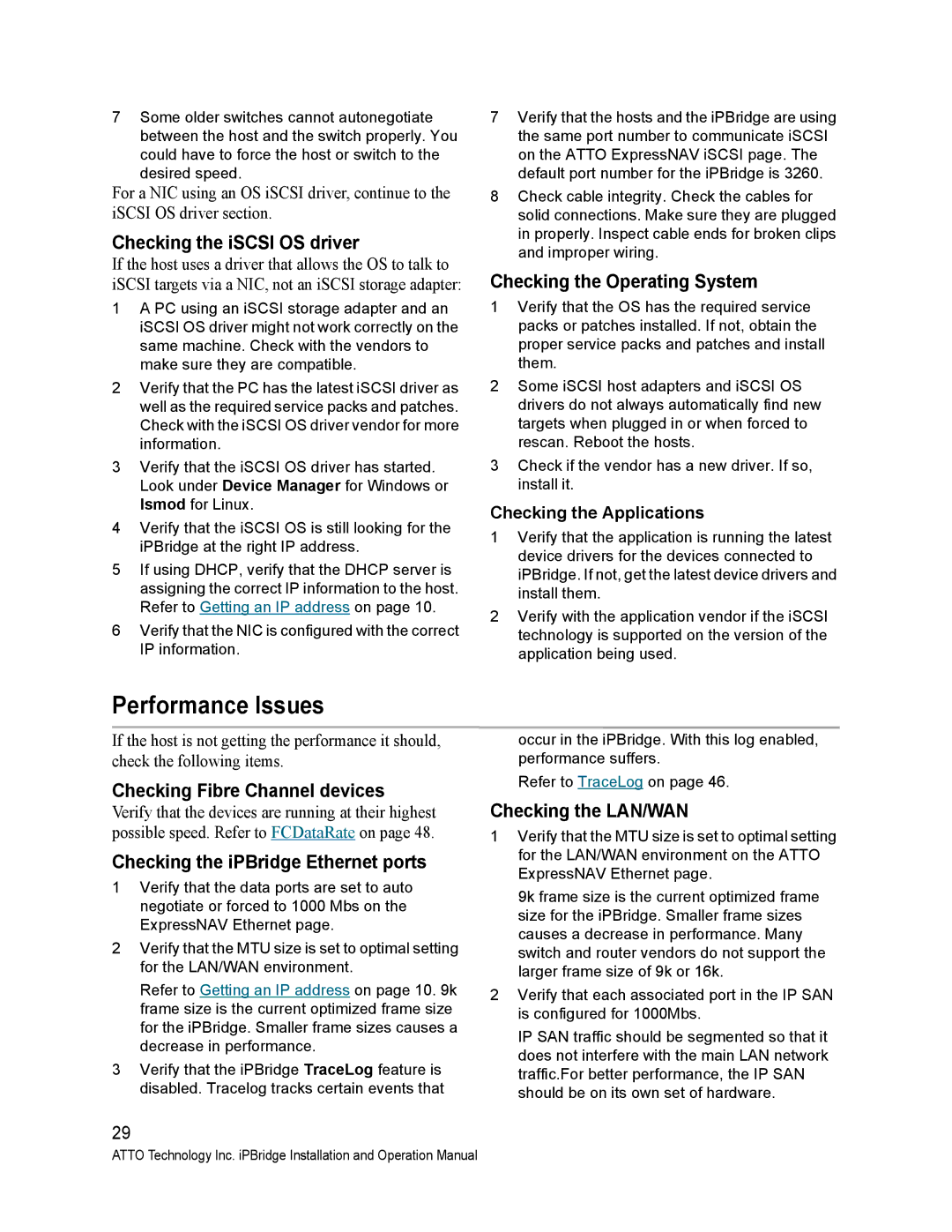7Some older switches cannot autonegotiate between the host and the switch properly. You could have to force the host or switch to the desired speed.
For a NIC using an OS iSCSI driver, continue to the iSCSI OS driver section.
Checking the iSCSI OS driver
If the host uses a driver that allows the OS to talk to iSCSI targets via a NIC, not an iSCSI storage adapter:
1A PC using an iSCSI storage adapter and an iSCSI OS driver might not work correctly on the same machine. Check with the vendors to make sure they are compatible.
2Verify that the PC has the latest iSCSI driver as well as the required service packs and patches. Check with the iSCSI OS driver vendor for more information.
3Verify that the iSCSI OS driver has started. Look under Device Manager for Windows or lsmod for Linux.
4Verify that the iSCSI OS is still looking for the iPBridge at the right IP address.
5If using DHCP, verify that the DHCP server is assigning the correct IP information to the host. Refer to Getting an IP address on page 10.
6Verify that the NIC is configured with the correct IP information.
7Verify that the hosts and the iPBridge are using the same port number to communicate iSCSI on the ATTO ExpressNAV iSCSI page. The default port number for the iPBridge is 3260.
8Check cable integrity. Check the cables for solid connections. Make sure they are plugged in properly. Inspect cable ends for broken clips and improper wiring.
Checking the Operating System
1Verify that the OS has the required service packs or patches installed. If not, obtain the proper service packs and patches and install them.
2Some iSCSI host adapters and iSCSI OS drivers do not always automatically find new targets when plugged in or when forced to rescan. Reboot the hosts.
3Check if the vendor has a new driver. If so, install it.
Checking the Applications
1Verify that the application is running the latest device drivers for the devices connected to iPBridge. If not, get the latest device drivers and install them.
2Verify with the application vendor if the iSCSI technology is supported on the version of the application being used.
Performance Issues
If the host is not getting the performance it should, check the following items.
Checking Fibre Channel devices
Verify that the devices are running at their highest possible speed. Refer to FCDataRate on page 48.
Checking the iPBridge Ethernet ports
1Verify that the data ports are set to auto negotiate or forced to 1000 Mbs on the ExpressNAV Ethernet page.
2Verify that the MTU size is set to optimal setting for the LAN/WAN environment.
Refer to Getting an IP address on page 10. 9k frame size is the current optimized frame size for the iPBridge. Smaller frame sizes causes a decrease in performance.
3Verify that the iPBridge TraceLog feature is disabled. Tracelog tracks certain events that
29
occur in the iPBridge. With this log enabled, performance suffers.
Refer to TraceLog on page 46.
Checking the LAN/WAN
1Verify that the MTU size is set to optimal setting for the LAN/WAN environment on the ATTO ExpressNAV Ethernet page.
9k frame size is the current optimized frame size for the iPBridge. Smaller frame sizes causes a decrease in performance. Many switch and router vendors do not support the larger frame size of 9k or 16k.
2Verify that each associated port in the IP SAN is configured for 1000Mbs.
IP SAN traffic should be segmented so that it does not interfere with the main LAN network traffic.For better performance, the IP SAN should be on its own set of hardware.
ATTO Technology Inc. iPBridge Installation and Operation Manual
